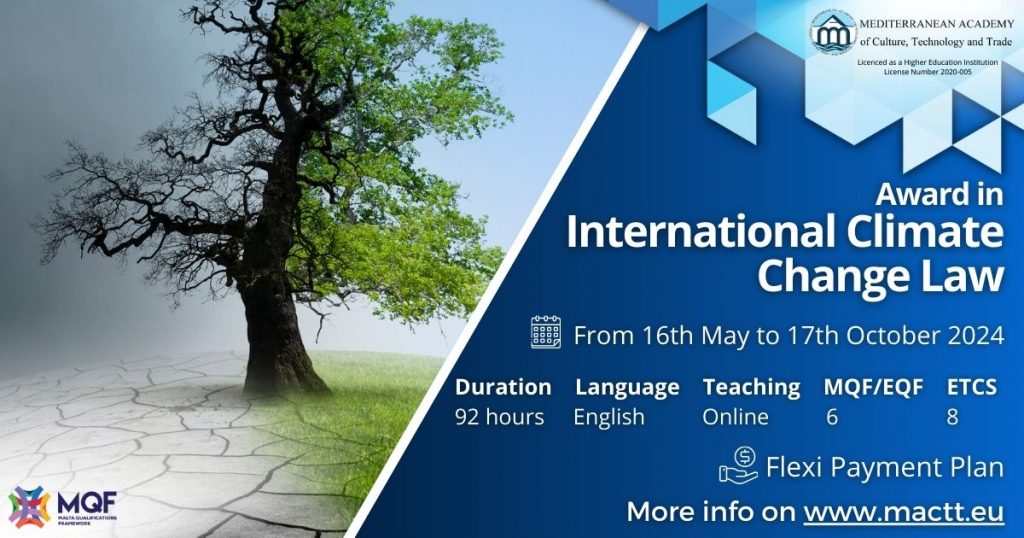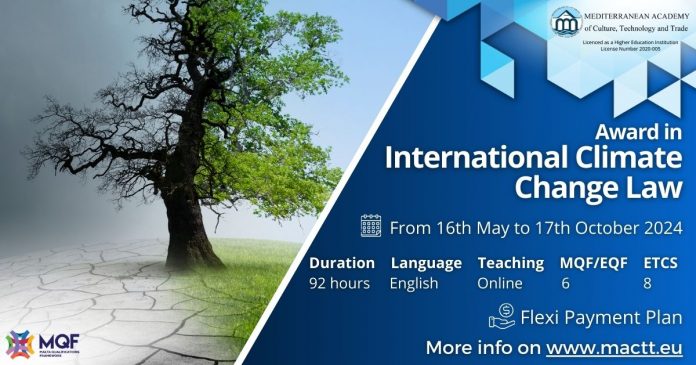Learn how the “Award in International Climate Change Law” course prepares professionals to lead the fight against climate change through law.
In the modern world, climate change is one of the most complex and urgent challenges. Its global reach and profound impact on the environment, the economy and society require coordinated and effective action.
In this context, international law emerges as a crucial tool, providing the framework for collective action to mitigate the effects of climate change and adapt to its inevitable consequences.
Through international agreements such as the Kyoto Protocol and the Paris Agreement, international law seeks to establish binding commitments for countries, promoting the reduction of greenhouse gas emissions and supporting sustainable development.
The role of international law in sustainable climate change.
The urgent global challenge of climate change requires a coordinated and multilateral response, in which international law plays a crucial role. Key legal instruments include the Kyoto Protocol and the Paris Agreement, which are key pillars in the fight against global warming.
The Kyoto Protocol, adopted in 1997, was the first international agreement to set legally binding targets for reducing greenhouse gas emissions for industrialised countries. It has introduced innovative mechanisms such as emissions trading, promoting a market-based approach to tackling the climate crisis.
The 2015 Paris Agreement marked a further step forward, committing more than 190 countries to take action to limit the global temperature rise well below 2 ºC to pre-industrial levels, with the goal of not exceeding 1,Article 5 C. This agreement underlined the importance of international cooperation, requiring all countries to submit national emission reduction plans and to progressively strengthen these commitments over time.
The effectiveness of these International Legal instruments is measured not only in the Ability to Reduce Greenhouse Gas Emissions, but also in promoting adaptation to climate change already underway.
Well-designed laws and policies can catalyse climate action, driving investment in clean technologies, strengthening the climate resilience of vulnerable communities and ensuring that the transition to a low-carbon economy is equitable and inclusive.
International climate law, therefore, not only delineates the boundaries of climate action, but also inspires and facilitates global collaboration towards shared sustainability goals.
The ‘Award in International Climate Change Law’ Course
The Award in International Climate Change Law course, delivered entirely online and in English by synchronous lectures, offers a comprehensive and in-depth overview of the legal challenges and opportunities presented by global climate change.
Through a focused curricular structure, participants are introduced to the key concepts and structures of international climate law, including key agreements such as the Kyoto Protocol and the Paris Agreement. The focus of the course extends beyond theory, focusing on the practical applications of climate law in mitigation and adaptation strategies, international treaty negotiation and environmental conflict resolution.

A distinguishing feature of the course is its holistic approach, which not only equips participants with a solid theoretical understanding but also prepares them for the real-world challenges through simulations, case study analyses and interactive discussions. This practical approach ensures that students are well positioned to apply their skills in the real world, making them valuable assets to legal organisations, government agencies, NGOs and companies committed to environmental sustainability.
Participating in this course represents a significant investment in one’s professional career. Students will not only gain an in-depth understanding of the legal dynamics governing the global climate, but also develop crucial analytical and negotiation skills.
These skills are increasingly in demand in a world that demands innovative and collaborative responses to climate problems. In addition, the course offers networking opportunities with industry professionals and academics, opening the door to future collaborations and career advancement in the emerging field of international climate law.
Why this course is different
The “Award in International Climate Change Law” course stands out for its unique approach to teaching international climate law, masterfully balancing legal theory with practical case studies and simulations. This methodology not only enriches students’ theoretical understanding, but directly immerses them in the real challenges and opportunities that climate law presents.
One of the most innovative aspects of the course is the use of case studies drawn from real-life situations, allowing students to explore and analyse the complex legal, political and economic dynamics that influence climate change policies at the global level. These case studies cover a wide range of topics, from the implementation of international agreements to climate change legal disputes, giving students a holistic view of the various facets of climate law.
In addition, negotiation simulations will provide students with a unique opportunity to practise their legal and negotiation skills in scenarios that emulate international climate negotiations. This practical experience is crucial to prepare future practitioners to successfully navigate the complex landscape of international climate law.
The combination of a rigorous theoretical curriculum and the wide use of practical methodologies makes the “Award in International Climate Change Law” course a unique and cutting-edge program.






